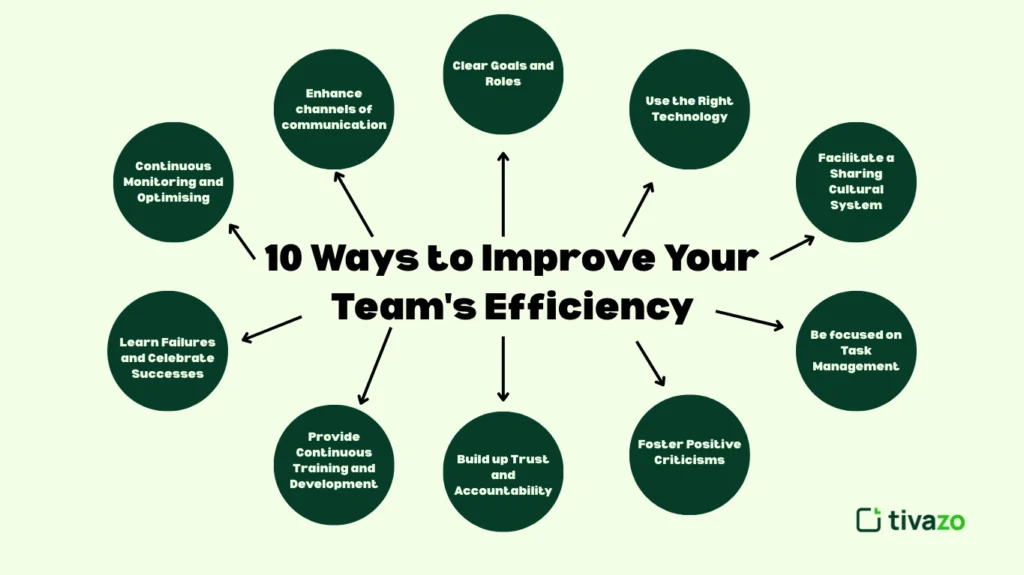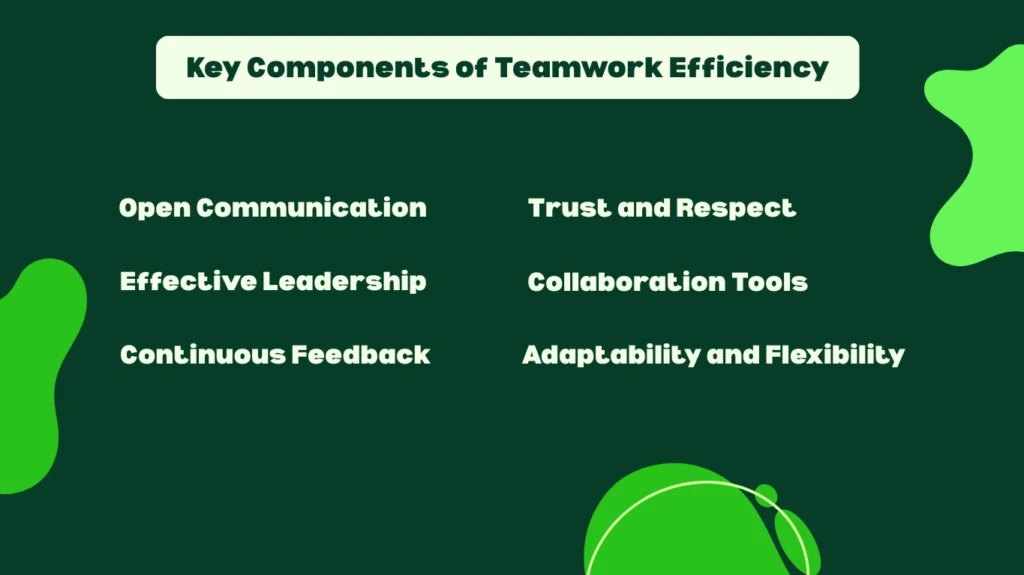Leading organizations are not made by people who work alone; they are made by the collaboration of teams that work as a well-oiled machine. Teamwork efficiency is the spine of these high-performing groups, which is essential in long-term sustainability and flexibility.
The handbook delves into the meaning of teamwork efficiency, the necessity of teamwork efficiency, and how teamwork efficiency can be increased within any organization, regardless of its structure (a startup or a global-scale enterprise).
What is Teamwork Efficiency?
Teamwork efficiency can be defined as to what extent in completion of its tasks, addressing problems, and meeting its objectives a team can operate effectively with minimum wastage of effort, time, and resources. It is not only hard work but smart work collectively. When teams are made to work effectively, the productivity and morale reach new heights, and the results are self-explanatory.
Why Teamwork Efficiency is Important
Enhanced Productivity
Effective working teams are well able to finish projects fast without compromising their quality. Teamwork is more efficient because it minimizes redundancy of efforts and work in general, removing any unnecessary work until it comes down to what matters most: high-impact work and results.
Better Communication
Communication that is open and structured is likely to cut short on misunderstandings, delays, and the inability to be on the same page on goals and duties. When greater efficiency in teamwork is desired, the discussions have become more goal-oriented, and collaboration comes easily.
Improved Morale
Job satisfaction among team members increases when they can clearly define their roles, trust various members in the team, and work flows are smooth. Effective teamwork helps to promote a positive environment in which individuals tend to feel appreciated and want to give their best.
Quick Problem Solving
Well-functioning teams are able to find problems, generate ideas to address them, and make changes fast. They are able to adjust and react without being drowned in bureaucracy or confusion when their procedures are renewed and processes are identified clearly, and there is a bond of trust among them.
Stronger Innovation
The aspect of experimentation and sharing of ideas is achieved when there is a well-knit team. Efficient teamwork allows people to devote more time to their innovation instead of explaining responsibilities or correcting mistakes that could have been avoided.
10 Ways to Improve Your Team’s Efficiency at Work

1. Clear Goals and Roles
Each of the team members is supposed to know what is expected of them in the work and the overall goals. With specifically defined and company-goal-oriented roles, team members have an opportunity to concentrate their efforts towards a better result, resulting in enhanced coordination and teamwork efficiency.
2. Enhance channels of communication
Encourage open communication by conducting frequent check-ins, stand-up meetings, and using real-time collaboration tools. Creating a system of open, habitual interaction keeps team members up to date and minimizes changes, which is all essential in the context of improving team efficiency.
3. Use the Right Technology
To make workflows efficient and ensure alignment, use Asana, Slack, or Microsoft Teams as tools for project management and communication. The appropriate tech stack will provide a greater level of organization, automation of routine activities, and the possibility to collaborate harmoniously in remote environments.
4. Facilitate a Sharing Cultural System
Promote the spread of knowledge cross cross-functional collaboration. Establish a culture that encourages people to help each other and drive to use the other person as a strength. Such a collaborative environment boosts trust and drives team efficiency.
5. Be focused on Task Management
Pay attention to the techniques based on prioritization (Eisenhower Matrix, Kanban boards) to know what should be a priority and not to spend time on the actions with a low level of impact. Effective task management enables teams to be focused on key performance objectives and minimises the feeling of overwhelm.
6. Foster Positive Criticisms
Make feedback a normal two-way exercise. Teams need to be free to give ideas and raise concerns. Positive feedback advances the work, overcomes the difficulties in the early stages, and enhances the efficiency of the teamwork due to the learning process.
7. Build up Trust and Accountability
Create an atmosphere of trust in which team members assume responsibility for what they do. Trust enables one to make decisions in a decentralized way, with fewer bottlenecks, and people operate with confidence, leading to progress being made at a faster rate in a more efficient way.
8. Provide Continuous Training and Development
Create a workforce that is competent in increasing productivity and communication. Mix intellectual stimulation with workshops, mentoring, and professional development programs. This improves the individual skills as well as those of teams as a whole.
9. Learn Failures and Celebrate Successes
Being aware of wins raises their morale and builds team spirit. What is equally crucial, setbacks can be analyzed as a source of growth. Team dynamics and long-term efficiency are enhanced by learning from positive experiences and negative experiences as well.
10. Continuous Monitoring and Optimising
Analyze performance information and team analysis to determine the bottlenecks and adjust them. Regular evaluation of processes, equipment, and results helps teams to be nimble in their planning and competitive, but also keeps high teamwork efficiency in the long term.
Key Components of Teamwork Efficiency

Definite Goals and Roles
In a situation where goals are well defined, the teams know what they are aiming at. Allocation of individual roles and consolidation with these objectives eradicates confusion, eliminates duplication, and increases ownership.
Open Communication
Good teams create such an environment that allows communication without fear. This will guarantee prompt handling of misunderstandings and the ability of everyone to raise their voices, and this aspect alone is enough to increase the efficiency of teamwork.
Trust and Respect
Respect creates value of varying views, whereas trust creates confidence in a group. The attributes result in a more unified decision-making and make members more inclined to leadership without fear of judgment.
Effective Leadership
Good leaders establish the mood of teamwork. They give guidance, eliminate roadblocks, and promote their subordinates. A good leader inculcates the feeling of purpose and ensures that a team stays on course with the mission in order to strengthen teamwork effectiveness.
Collaboration Tools
Organization and visibility are enhanced with the help of such tools as Slack, Trello, or Google Drive. These websites enable the team members to remain connected, find shared resources, and work in real-time.
Continuous Feedback
Giving constructive feedback helps to grow and develop. The teams that share feedback on a regular basis can promptly address the issues related to inefficiency and improve their collaborative efficiency in the end.
Adaptability and Flexibility
Teams that are high performing have the ability to move with change without losing momentum. Flexibility helps them shift where required, acquire new tools or approaches, and adjust to new needs, which is the key to keeping teamwork efficiency.
Common Barriers to Teamwork Efficiency
Even the most competent teams might be confronted with problems that do not allow them to collaborate effectively. The first thing is identifying such obstacles to remove them and enhance teamwork efficiency.
Poor Communication
Misunderstanding and errors occur when different team members are not transparent with information, or when they do not express it frequently. Lack of adequate communication gives rise to wastage of resources and delays, as well as frustrations, all of which seriously minimize teamwork efficiency.
Unclear Objectives
In the absence of specific targets and expectations, teams may become confused or may be headed in divergent directions. An unclear purpose causes a loss in direction and role of both, thus, it is hard to track the success or coordinate the work.
Insufficient Trust
A successful team will always be based on trust. When team members are filled with suspicion over each other because of failure to trust, teamwork is affected. When there is no trust, micromanagement occurs, sharing ideas becomes a no-go and there is little accountability, which delays progress.
Ineffective Tools
Employment of old or wrong tools will cause communication constrictions and impede the workflow. In the absence of appropriate technology to enable effective collaboration and task management, team members waste their time performing troubleshooting instead of actually getting work done, which affects their overall teamwork efficiency.
Resistance against Change
Teams that do not succumb to embracing new working processes, technology, or approaches will be left behind. Constant change may be uncomfortable to some, yet teams must embrace it to achieve continuous improvement and maintain teamwork efficiency in a dynamic working environment.
Tools That Enhance Teamwork Efficiency
Selecting appropriate tools can enhance teamwork efficiency considerably by simplifying the communication process, controlling tasks, and providing feedback. These are some of the fundamental categories and the best tools to take note of:
Communication:
Real-time messaging, video chats, and collaboration are simplified with the help of such tools as Slack and Microsoft Teams. These sites make everybody connected; facilitate instant sharing of information, and minimize overloading of the email.
Project Management:
Tools like Asana, Trello, and Monday.com assist teams in organizing tasks, deadlines, and progress. They offer graphic workflows and automation capabilities, making projects stay on schedule and boost accountability.
File Sharing:
Communication services such as Google Drive and Dropbox make quick, safe sharing of documents possible wherever they are. Stored files in a central location also guarantee that there is never a version issue among team members, and files can be easily shared.
Time Tracking:
Other apps, such as Tivazo or Clockify, give teams the chance to follow the time consumption on different activities and projects. Knowing the time allocation also facilitates cutting down the inefficiency and managing the workload.
Feedback Systems:
There are 15Five and CultureAmp software that help develop a culture of constant feedback and employee response. Checking in and performance reviews via these resources ensures higher transparency levels, as well as the efficiency of teamwork due to the timely resolution of any problem.
Measuring Teamwork Efficiency
In order to enhance teamwork efficiency, you must also keep track of and evaluate the performance of your team. These are the efficient methods that can be used to evaluate the efficiency of your team:
Completion Rates Task:
Monitoring the frequency of work done on time can give an accurate vision of productivity and any obstacles or stalling in the work process. Best practices that ensure high completion rates should consistently be in place to ensure effective teamwork.
Team Satisfaction Surveys:
Direct feedback from team members in the form of surveys may aid in the assessment of morale, quality of communication, and collaboration. Contented, active groups are older and more fertile in their work.
Performance Reviews:
Team and individual performance should be assessed regularly to give an insight into the strengths and areas that need improvement. Strategically connecting the performance measurement with the outcomes of a team will strengthen accountability and lead to an increase in teamwork performance.
Meeting Effectiveness:
Evaluation of the effectiveness of meetings, their logical organization, and the achievement of results in them serves as an evaluation that will help prevent wasting time together. Effective meetings reduce time wastage and ensure that all parties follow common goals.
Conclusion
Teamwork efficiency is an evaluated and critical component of any effective organization. Communication can be improved by using the proper tools, and getting a collaborative culture can result in making very large improvements. Be it a small startup or a large business organization, it is worthwhile to concentrate on the efficiency of your team.
Considering the tips given in this guide and constantly improving your method, your team will be able to work smarter and more efficiently. Again, effective teams are cultivated with some kind of effort and practice in mind




